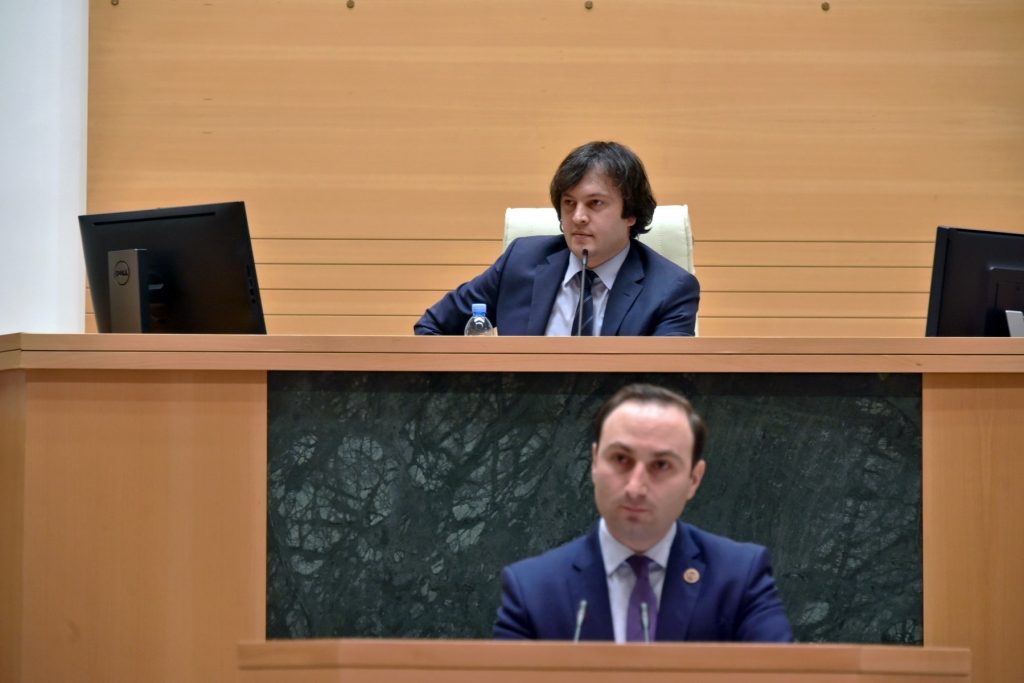With 87 votes for and 31 against, the Georgian Parliament endorsed with its second hearing on April 19 the controversial amendments to the Law of Georgia on Common Courts, backed by the ruling Georgian Dream party.
The lawmakers launched discussions on the bill at plenary sessions after the parliamentary committees held a series of sittings and the Venice Commission released its opinion about the bill. The ruling majority tried to launch discussions at a plenary session on April 17, but had to postpone it for a day amid the parliamentary opposition’s protest.
The discussions launched on April 18 lasted for two days. Anri Okhanashvili, chair of the Legal Issues Committee, who presented the bill to the lawmakers, noted that the proposed version reflected “almost all” recommendations given by the Venice Commission.
He said that the Georgian Dream compromised by omitting the requirement for qualification exams for potential judges and deciding that a High Council of Justice member wishing to compete for vacant Supreme Court seat will not be eligible to ask questions to and to assess the qualifications of another candidate.
“Over the past four months, we have carried out an absolutely transparent process, developing a detailed procedure [for selection and assessment of judges], which is without precedent” Okhanashvili said, adding that “we have taken into consideration all crucial recommendations of the Venice Commission.”
Political assessments
The bill drew strong criticism from opposition, who slammed the ruling majority for expediting the discussions and creating an impression of meeting the Venice Commission’s recommendations, without making required adaptations to the bill.
MP Tina Bokuchava of the opposition United National Movement accused Georgian Dream of lying, when it promised that all recommendations given by the Venice Commission would be reflected in the bill. “You staged a show to mislead the society. Actually, all these amendments will simply serve as a justification for you to propose the same list of judges under different procedures,” she said, adding that Georgian Dream leader, Bidzina Ivanishvili needs “Murusidze-Chinchaladze clan and the judiciary subordinated to this clan for the dirtiest of cases.”
MP Otar Kakhidze of the opposition European Georgia party said that the proposed bill does not reflect even a single crucial recommendation of the Venice Commission, including those on abolition of secret ballot and delaying a proportion of judicial appointments until after the next parliamentary elections. He accused the judiciary of acting on ruling party’s orders.
MP Mamuka Mdinaradze of the ruling party denied all accusations, saying that the opposition tries “to re-write history.” “They want to impede the judiciary, they have no other interests,” he noted.
“Opponents’ allegations that not a single [Venice Commission] recommendation has been met, are a lie,” he said, adding that the recommendations on qualification exams and conflict of interests have been fully met.
Public Defender’s assessment
Georgian Public Defender Nino Lomjaria, who reported to the Parliament on April 19, said that the process was carried out in a hasty manner and that “the issue requires more time and more discussion.”
She praised the ruling party for sharing the recommendations on qualification exams and on avoiding the conflict of interests, explaining however, that the latter amendment needed more clarification.
“HCoJ members wishing to compete for vacant Supreme Court seats should be completely excluded from all procedures related to the competition… this does not only mean that they should not take part in voting,” Lomjaria noted.
She also focused on the recommendations that require written substantiation of decisions by HCoJ and HCoJ judicial candidates must have a right to legal recourse, noting that regrettably, these points were not taken into consideration.
She expressed hope that these points, as well as the criticisms and proposals made during the session would be taken into account before the bill becomes the law.
This post is also available in: ქართული (Georgian) Русский (Russian)

